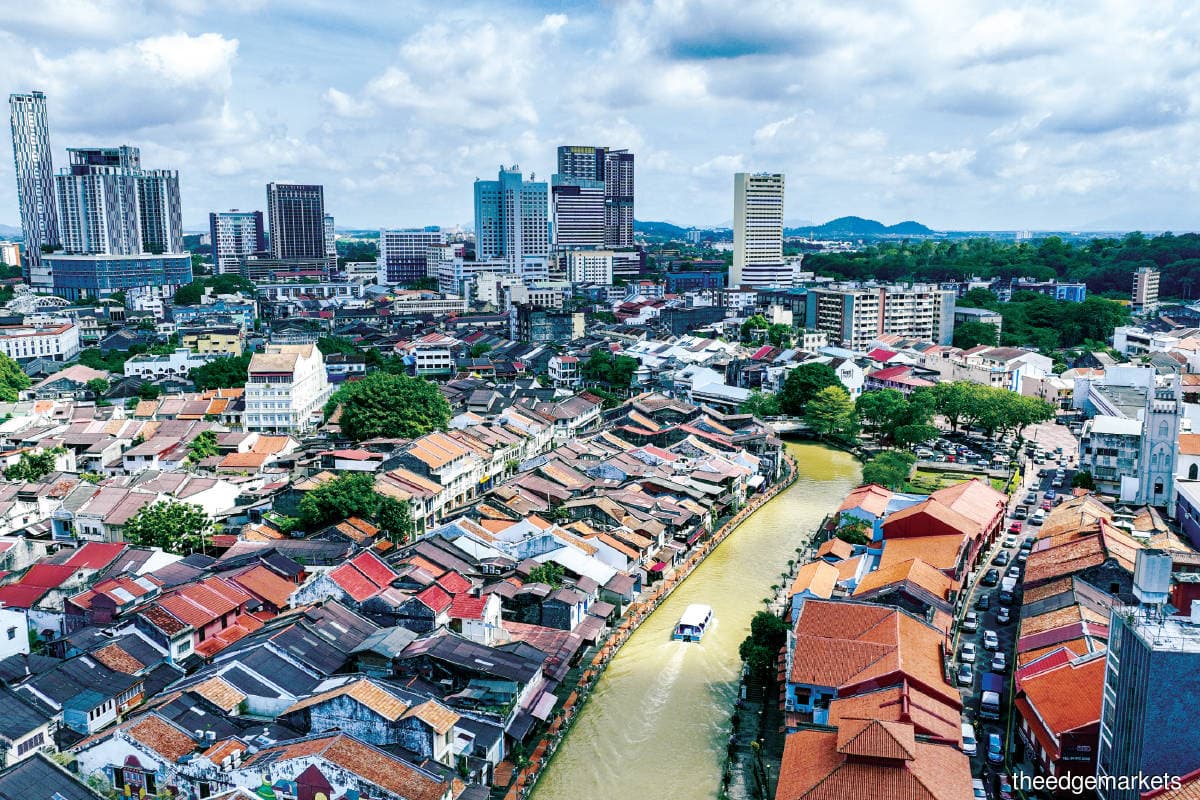
This article first appeared in The Edge Malaysia Weekly on January 23, 2023 - January 29, 2023
Melaka was chosen to be part of a global city-to-city capacity building programme for circular economy projects last year, thanks to its commitment to sustainability. It was one of nine participating learning cities in Asia-Pacific and Latin America.
The programme, Urban Ocean, was organised by The Circulate Initiative (TCI) — a non-profit organisation focused on solving ocean plastic pollution — alongside non-profit Ocean Conservancy and the Resilient Cities Network.
Urban Ocean is a capacity building and project accelerator programme designed with cities for cities, and primarily uses peer-to-peer learning to raise awareness about ocean plastic pollution and improve waste management systems. Badly managed waste in cities, after all, end up in oceans as it flows through rivers.
According to TCI, plastic pollution costs an estimated US$2.5 trillion (RM11 trillion) to the global economy annually and has severe impact on human health and the environment. Cities are home to over half of the world’s population, according to the United Nations. Tackling plastic pollution from where it is generated is thus important.
“We [TCI] are going to close knowledge gaps and provide insights into the solutions and tools to navigate this problem. It can help decision-makers look at the wider picture, since the plastic waste problem is also a climate problem,” says Umesh Madhavan, TCI’s research director. He also leads the Insights team — a group of experts, alongside a network of strategic partners, that develops insights and tools to solve plastic pollution.
Urban Ocean cities are divided into two categories: mentor and learning. Mentor cities are matched with learning cities because they have better practices in waste management.
Mentor cities are selected based on their proven track record of implementing circular economy strategies and their commitment towards combating river and ocean plastic. Mentor cities in Urban Ocean include Milan, Italy, and Velje, Denmark.
Learning cities are selected due to their diligence in improving waste management and creating circular systems, as well as their potential to provide solutions in regions with high waste leakage rates.
“After 15 months of incubation and programme planning with Urban Ocean, Melaka presented its project ideas to not only improve its waste management systems and reduce plastic leakage but also to get opportunities for potential partners and funders,” says Umesh.
The participating cities presented their plans to tackle plastic pollution in the virtual Accelerator Summit in April last year.
Through the Urban Ocean gap assessment, Melaka identified a few challenges. One is the lack of suitable technology to clean and monitor the cleanliness of its rivers and coastal areas. The main river running through the city centre, according to Melaka’s project statement, is classified as mildly polluted.
There is also flood risk due to an ageing and poorly maintained drainage system, a waste management system that is not integrated, and lack of awareness for waste segregation at source. Cigarettes and food waste are a huge contributor to the city’s waste.
Melaka identified three targeted actions to address these problems. First, it will introduce policies like no plastic bags, waste separation at source, grease traps and zero-waste programmes to ensure the cleanliness of rivers and coastal areas.
Second, it will review its smoke-free and litter-free policies and enhance its waste collection system. This would mean placing recycling bins at tourist attractions and residential areas, setting up a smoke-free programme and eliminating the use of polystyrene.
Third, Melaka will establish a city taskforce, chaired by the Melaka Historic City Council, to communicate these initiatives to all stakeholders, including the community.
“Implementation is not as easy as it seems … When it comes to plastic waste, people would say that they would like to buy bio-based compostable plastics. [In reality] when it comes to shopping, you would see people buying things with multi-layered or single-use plastic packaging. These are obviously cheaper [than bio-based compostable plastics],” says Umesh.
Encouraging change in behaviour and mindset is therefore crucial. “Personal communication and engagement need to happen. Start with the consumer behaviour and see opportunities to change that, then you move downstream along the value chain. Communicate and inculcate that behaviour, and work on the infrastructure to support that [behavioural change].”
Introducing toolkits to manage waste
TCI has developed a tool called the Plastic Lifecycle Assessment Calculator for the Environment and Society (PLACES), which studies the potential greenhouse gas (GHG) emission reductions and economic impact from implementing waste management programmes.
The organisation was inspired by the US’ Environmental Protection Agency’s Waste Reduction Model (WARM) tool. “WARM strongly depicts the connection between climate change, plastics and waste management. But WARM is based on the waste management context in the US, which is very different from any of our markets [in Southeast Asia and Asia-Pacific]. When we look at our markets, we have informal waste collectors. The processes through which the materials flow and the kind of plastic [collected] are all quite different,” says Umesh.
“We developed PLACES to help those in the ecosystem — for example, recyclers or city planners — to better understand and track the environmental impact of plastic waste management and recycling solutions that prevent plastic pollution.”
PLACES has been launched in India and Indonesia, which are major contributors of plastic waste. This trend is expected to continue with the rapid urbanisation of medium-sized cities and growing consumer populations.
“Now we’re wrapping up research for other countries. Malaysia is one of them. This tool can explain what better waste management means from a climate perspective,” says Umesh.
Save by subscribing to us for your print and/or digital copy.
P/S: The Edge is also available on Apple's App Store and Android's Google Play.


